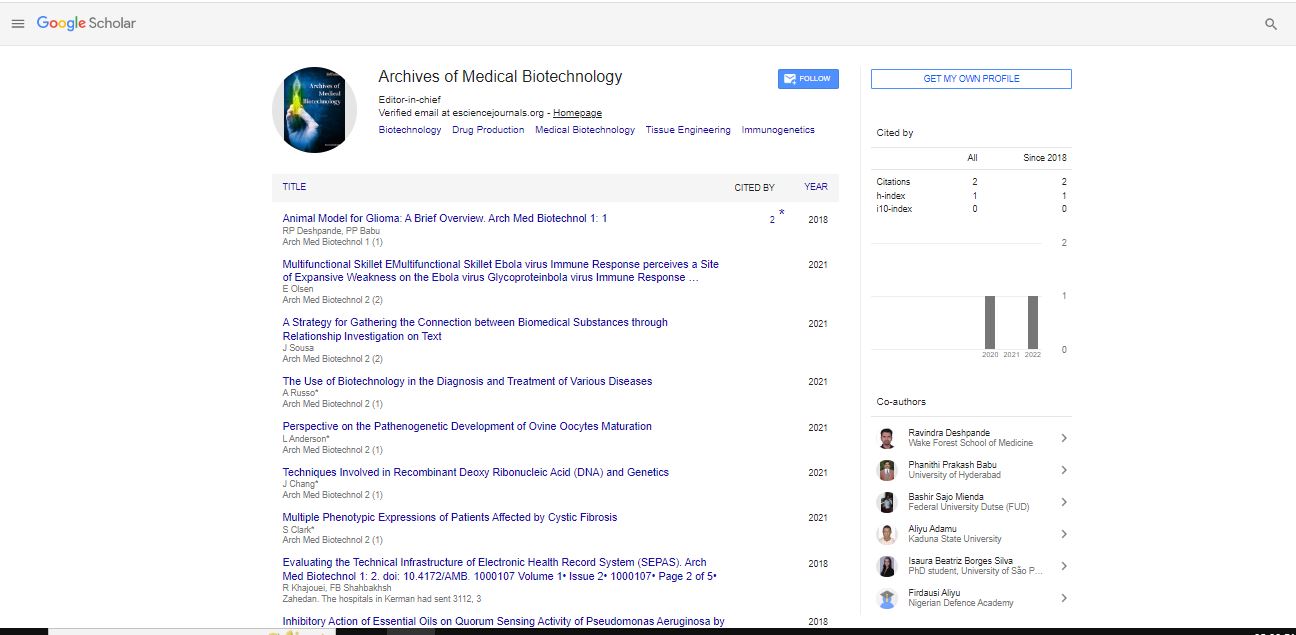Perspective, Arch Med Biotechnol Vol: 4 Issue: 2
Clinical Applications of Stem Cell Analysis and Ethical Concerns
Jing Chung*
Department of Internal Medicine, Section of Gastroenterology and Endocrinology, University of Göttingen, Gottingen, Germany
*Corresponding Author: Jing Chung,
Department of Internal Medicine, Section of
Gastroenterology and Endocrinology, University of Göttingen, Gottingen, Germany;
E-mail: Chungj@ufu.de
Received date: 22 May, 2023, Manuscript No. AMB-23-106369;
Editor assigned date: 24 May, 2023, PreQC No. AMB-23-106369 (PQ);
Reviewed date: 16 June, 2023, QC No. AMB-23-106369;
Revised date: 26 June, 2023, Manuscript No. AMB-23-106369 (R);
Published date: 03 July, 2023 DOI: 10.4172/amb.1000049.
Citation: Chung J (2023) Clinical Applications of Stem Cell Analysis and Ethical Concerns. Arch Med Biotechnol 4:2.
Abstract
Stem cells have emerged as a valuable tool in regenerative medicine, offering potential treatments for various diseases and injuries. Providing an overview of the applications of stem cells in regenerative medicine, focusing on their use in tissue engineering, organ transplantation, and cellular therapies, considering different types of stem cells, including embryonic stem cells and adult stem cells, and highlights their unique properties and therapeutic potential. The manuscript also addresses the challenges and ethical considerations associated with stem cell research and clinical translation. Overall, stem cells hold great promise for regenerative medicine and have the potential to revolutionize healthcare in the future.
Keywords: Regenerative medicine; Clinical translation; Adult stem cells
Description
Regenerative medicine aims to restore or replace damaged tissues and organs through the use of cells, biomaterials, and other regenerative techniques. Stem cells, characterized by their ability to self-renew and differentiate into specialized cell types, have gained significant attention in this field. Stem cells can be derived from various sources, including embryos, umbilical cord blood, and adult tissues, and they hold immense potential for tissue repair and regeneration.
Types of stem cells
Embryonic Stem Cells (ESCs) are derived from early-stage embryos and have the capacity to differentiate into any cell type in the body. However, their use raises ethical concerns due to the destruction of embryos. Adult stem cells, on the other hand, are found in various tissues throughout the body and have a more limited differentiation potential. They can give rise to specific cell types, such as blood cells or neurons, and are generally considered ethically acceptable for research and therapeutic purposes.
Applications in tissue engineering
Stem cells are extensively used in tissue engineering to develop functional tissues or organs. By combining stem cells with biomaterial scaffolds and growth factors, tissue engineers can create threedimensional structures that mimic natural tissues. Stem cells can differentiate and integrate into these scaffolds, leading to the formation of functional tissue constructs. This approach has enhanced the regeneration of bone, cartilage, heart tissue, and many other organs.
Organ transplantation
Stem cells have the potential to revolutionize organ transplantation by addressing the shortage of donor organs. By coaxing stem cells to differentiate into specific cell types, researchers aim to generate replacement organs in the laboratory. While this field is still in its early stages, scientists have successfully grown simple organs, such as bladders and tracheas, and are actively pursuing the development of more complex organs, including kidneys and livers.
Cellular therapies
Stem cells also hold promise for cellular therapies, where they can be used to repair or replace damaged cells in the body. For example, hematopoietic stem cell transplantation has been used for decades to treat blood-related disorders, such as leukemia. Similarly, mesenchymal stem cells have shown potential in the treatment of conditions like heart disease, diabetes, and neurodegenerative disorders.
Challenges and ethical considerations
Despite the tremendous potential of stem cells, several challenges must be overcome for their widespread clinical application. These include issues related to cell sourcing, standardization of manufacturing processes, immune rejection, and long-term safety. Ethical considerations surrounding the use of embryonic stem cells and germline editing also require careful deliberation to ensure responsible and ethical practices.
Conclusion
Stem cells offer remarkable potential for regenerative medicine, with applications ranging from tissue engineering to organ transplantation and cellular therapies. While significant progress has been made, further research is needed to address the challenges and ethical concerns associated with stem cell-based therapies. With continued advancements in stem cell analysis and technology, regenerative medicine are enhanced for revolutionizing healthcare and improving patient outcomes in the future.
 Spanish
Spanish  Chinese
Chinese  Russian
Russian  German
German  French
French  Japanese
Japanese  Portuguese
Portuguese  Hindi
Hindi 